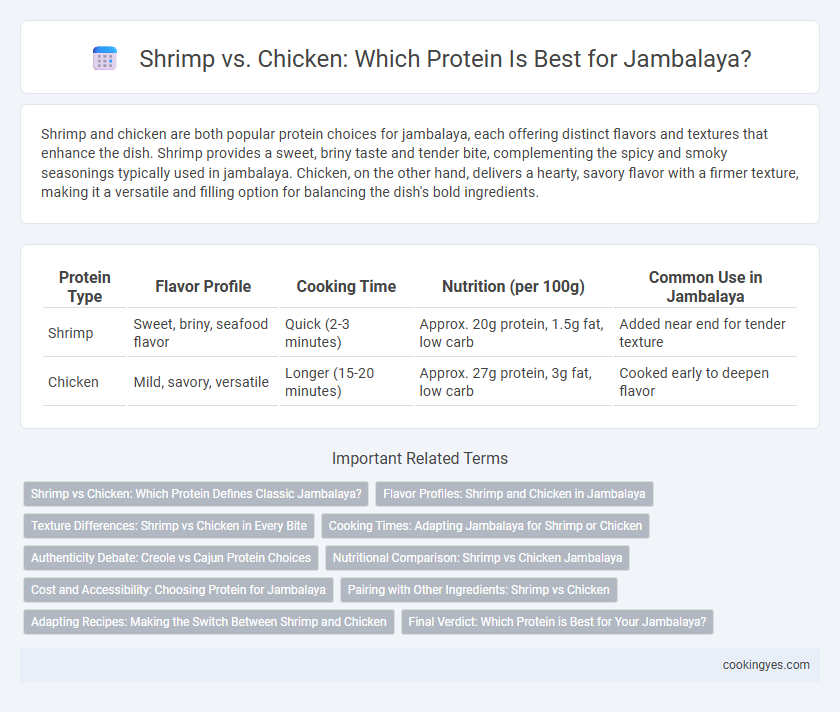Shrimp and chicken are both popular protein choices for jambalaya, each offering distinct flavors and textures that enhance the dish. Shrimp provides a sweet, briny taste and tender bite, complementing the spicy and smoky seasonings typically used in jambalaya. Chicken, on the other hand, delivers a hearty, savory flavor with a firmer texture, making it a versatile and filling option for balancing the dish's bold ingredients.
Table of Comparison
| Protein Type | Flavor Profile | Cooking Time | Nutrition (per 100g) | Common Use in Jambalaya |
|---|---|---|---|---|
| Shrimp | Sweet, briny, seafood flavor | Quick (2-3 minutes) | Approx. 20g protein, 1.5g fat, low carb | Added near end for tender texture |
| Chicken | Mild, savory, versatile | Longer (15-20 minutes) | Approx. 27g protein, 3g fat, low carb | Cooked early to deepen flavor |
Shrimp vs Chicken: Which Protein Defines Classic Jambalaya?
Shrimp and chicken both play iconic roles in classic jambalaya, yet their distinct flavors shape different experiences of the dish. Shrimp offers a briny, tender texture that infuses the rice with rich seafood essence, ideal for Creole jambalaya, while chicken provides a hearty, savory base traditional in Cajun jambalaya. Deciding between shrimp and chicken hinges on regional style preferences and desired taste profiles, with shrimp defining a lighter, coastal jambalaya and chicken anchoring a robust, Cajun version.
Flavor Profiles: Shrimp and Chicken in Jambalaya
Shrimp in jambalaya offers a sweet, briny flavor that enhances the dish's Cajun roots, providing a tender, succulent texture that balances well with spicy seasonings. Chicken imparts a hearty, savory taste with a firmer texture, absorbing the rich tomato-based sauce and bold spices uniquely. Choosing between shrimp and chicken ultimately affects the depth of flavor, with shrimp delivering a lighter, oceanic freshness and chicken contributing robust, meaty notes.
Texture Differences: Shrimp vs Chicken in Every Bite
Shrimp delivers a firm, slightly chewy texture that contrasts with the tender, juicy bite of chicken in jambalaya, offering distinct mouthfeel experiences. The succulent snap of shrimp adds a briny freshness that complements the dish's spices, while chicken provides a hearty, meaty softness that soaks up flavorful sauces. Choosing shrimp or chicken alters the overall bite texture, influencing the dish's richness and balance with each mouthful.
Cooking Times: Adapting Jambalaya for Shrimp or Chicken
Shrimp cooks significantly faster than chicken in jambalaya, requiring just 3 to 5 minutes to turn pink and opaque, ensuring it remains tender and avoids toughness. Chicken, especially boneless cuts, should be cooked for about 10 to 15 minutes to reach a safe internal temperature of 165degF (74degC) and develop a rich, savory flavor. Adjusting cooking times for each protein maintains the dish's texture balance and optimal taste without overcooking.
Authenticity Debate: Creole vs Cajun Protein Choices
Shrimp and chicken serve as iconic proteins in Jambalaya, reflecting the distinct culinary traditions of Creole and Cajun cuisines. Creole Jambalaya often features shrimp, emphasizing seafood from the Gulf Coast, while Cajun Jambalaya traditionally highlights chicken, showcasing rustic, land-based ingredients. The authenticity debate underscores regional influences, with shrimp symbolizing the coastal origins of Creole cooking and chicken representing the hearty, farm-to-table roots of Cajun culture.
Nutritional Comparison: Shrimp vs Chicken Jambalaya
Shrimp provides a leaner protein option for jambalaya, offering approximately 20 grams of protein and only 1 gram of fat per 3-ounce serving, along with significant amounts of vitamin B12, selenium, and omega-3 fatty acids. Chicken, especially skinless breast, delivers about 27 grams of protein and 3 grams of fat per 3-ounce portion, with higher vitamin B6 and niacin content supporting energy metabolism. Choosing shrimp or chicken affects not just flavor but also the nutritional profile, with shrimp being lower in calories and fat, while chicken contributes more iron and zinc to the dish.
Cost and Accessibility: Choosing Protein for Jambalaya
Shrimp often costs more per pound than chicken, making chicken a more budget-friendly option for Jambalaya. Chicken is widely accessible in most grocery stores year-round, while shrimp availability and price can fluctuate based on season and location. Opting for chicken enhances affordability and consistent supply, crucial factors in meal planning for Jambalaya recipes.
Pairing with Other Ingredients: Shrimp vs Chicken
Shrimp in jambalaya pairs exceptionally well with bold Cajun spices and subtle sweetness from bell peppers and tomatoes, enhancing the dish's coastal flavors. Chicken offers a heartier texture that complements smoky Andouille sausage and the earthiness of celery and onions, creating a robust, savory profile. Both proteins adapt well to traditional seasonings like paprika and cayenne but bring distinct tastes that influence the overall jambalaya experience.
Adapting Recipes: Making the Switch Between Shrimp and Chicken
Shrimp offers a quick-cooking, tender texture that infuses Jambalaya with a distinct seafood flavor, while chicken provides a heartier, meatier base that absorbs spices and simmers well. When adapting recipes, adjust cooking times--shrimp requires only minutes to cook, preventing overcooking, whereas chicken demands longer simmering to achieve tenderness and flavor depth. Balancing spice levels and liquid ratios ensures the dish remains cohesive whether opting for succulent shrimp or savory chicken as the primary protein.
Final Verdict: Which Protein is Best for Your Jambalaya?
Shrimp offers a delicate, sweet flavor and quicker cooking time, making it ideal for a lighter, seafood-inspired jambalaya, while chicken provides a hearty, savory profile perfect for a more traditional, robust dish. The choice between shrimp and chicken depends on your flavor preference and desired texture, with shrimp lending a tender bite and chicken delivering a satisfying firmness. For an authentic Louisiana jambalaya, many chefs recommend chicken for its versatility and richness, but combining both proteins can create a balanced and flavorful meal.
Shrimp vs Chicken for Jambalaya protein Infographic

 cookingyes.com
cookingyes.com